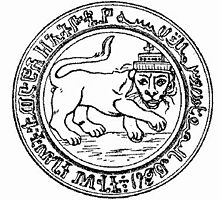Negus

Negus ( nəguś , Amharic ንጉሥ ) means “ king ” in the ancient Ethiopian and Amharic languages and is one of the oldest feudal titles of the Abyssinian Empire .
Name story
The history of the title is traced back to the time of the empire of Aksum . A Negus was an independent ruler and was only subject to the Emperor of Ethiopia, and only formally. The Ethiopian emperor himself carried the title Neguse Negest (also transcribed as Negusa Nagast , Amharic ንጉሠ ነገሥት ), which means king of kings . The title Neguse Negest is yet to Solomon his alleged son, the Ethiopian I. Menelik have awarded.
The title was first mentioned in the English-speaking world in 1594.
During the reign of Emperor Ba'eda Mariam from 1468 to 1478, this title was only available to the ruler of Gen. The importance of the negus decreased when the central power was strong and increased when the central power was weak. In later times the emperors could also bestow the title Negus on the rulers of Shewa , Gonder , Tigray and Gojjam .
As the last Negus 1928, Ras Tafari Makonnen Empress Zauditu to Negus crowned (without specifying Province). Ras Tafari became Emperor of Ethiopia in 1930 as Haile Selassie I. During his reign there was no more coronation of a Negus.